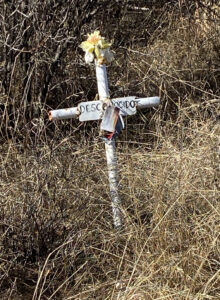Trip to border prompts a question: How can we help?
Apr 04, 2023
 Entire lives contained in a backpack.
Entire lives contained in a backpack.
Crosses in the desert.
An inexhaustible drive to survive.
Those are among the impressions etched in the memories of three Wisconsin Conference UCC members who traveled earlier this year to Sahuarita, Arizona, just north of the U.S. border with Mexico. The three – Associate Conference Minister Lisa Hart and Judy and Mark Emmrich of McFarland UCC, members of the Conference’s Immigration Working Group – attended the Common Ground Conference, organized by Good Shepherd UCC in Sahuarita. They went mostly to learn but returned with ideas for how individuals and congregations can support ministry to migrants who cross the border to escape violence in their home country and to seek economic opportunities in the U.S.
“The desert in Arizona is incredibly harsh,” Lisa said. “It’s rocky. The vegetation is sharp and prickly. It’s a very dangerous place if you’re not prepared to be out there.
“People are willing to risk their lives to get to a safe place to live. Many of them, if they go back home, are going to die. They are willing to take these chances. The will to survive has to be incredibly strong to make the trip.”
The crosses in the desert, placed the Green Valley-Sahuarita Samaritans, a humanitarian aid organization, provide a graphic reminder of the risks.
“We stopped at one place where a group was putting a cross at every spot where they’ve found a body in the desert. The one we saw was only 30 yards off the road,” said Mark Emmrich, who accompanied a group of Samaritans looking for people who had crossed the border.
Judy Emmrich visited a shelter on the Mexican side of the border that provides a refuge for asylum-seekers awaiting entry into the U.S.
She was struck by “just seeing these healthy kids running around so happy and to think that a couple of weeks before they were in danger of dying.”
Those migrants who receive asylum are released into the U.S. with nothing but the clothes on their back and their documents – “dropped off with zero,” Judy said. “I didn’t see children with a stuffed animal or even a pacifier. Nothing.”
Her husband put it this way: “Their life is in a backpack.”
The three travelers offered these suggestions for individuals and congregations in the Wisconsin Conference seeking to support migrants:
Educate yourself and encourage others to do the same. Learn from those who have visited the border. If you have the opportunity to travel to the border, try to take advantage of it. “There is value in people experiencing firsthand what’s going on,” Lisa said. “Once you see it, you can’t unsee it.”
Purchase fair trade products, especially coffee. “Every time we drink a cup of cheap coffee, we’re one of the reasons migrants come here,” Lisa said, noting that many growers in Mexico are not paid a fair price for their coffee. “They can make in three to five weeks (in the U.S.) what they would make in a year growing coffee in Mexico.
Consider sponsoring an asylum-seeker. Individuals must have a U.S. sponsor to receive asylum. “Sometimes, these people gain asylum and then the sponsor changes their mind,” Judy said. “Churches can step in.” The Emmrichs have done just that for some students at Madison College, where Judy is a longtime ESL teacher.
Support an existing program. McFarland UCC provided seed money to the Madison College Foundation to start a scholarship for immigrant students in certain programs. You can donate online here. In the “designation” menu, choose “other” and write “First Step Scholarship.” Or you can write a check to payable to Madison College Foundation and mail it to DMB Community Bank, c/o Madison College Foundation, Attn: Colleen Coyle, P.O. Box 419, DeForest, WI 53532. Write “First Step Scholarship” in the memo line.
‹ Back to News & Updates



Sign up for our newsletter!
Find us on
Contact Us